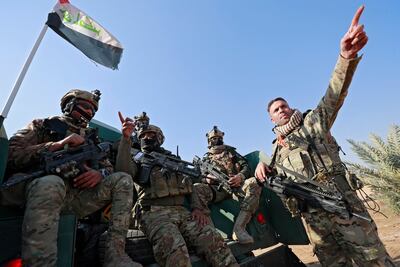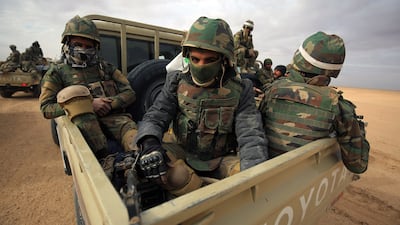ISIS has suffered significant blows over the past five years and the terrorist group’s threat remains low in the Middle East yet is growing in sub-Saharan Africa, experts told The National on Thursday.
The staying power of the group was in the spotlight when US Secretary of State Antony Blinken attended a meeting of the Global Coalition to Defeat ISIS, a cohort of 80 countries, in Riyadh on Thursday.
Sub-Saharan Africa has emerged as the global epicentre of terrorism as the region has accounted for nearly 50 per cent of terrorism deaths, according to the 2022 Global Terrorism Index.
ISIS’s expansion in sub-Saharan Africa is a bigger concern than in the Middle East, Aymenn Al Timimi, an expert on terrorism and fellow at the Middle East Forum, told The National.
The main concern is "the group is either exercising some territorial control – Sahel region and parts of Lake Chad area – or simply growing in lethality as an insurgent force – in eastern areas of Democratic Republic of Congo,” Mr Al Timimi said.
US Secretary of State Antony Blinken on Thursday said the war against ISIS was not over, during his visit to Saudi Arabia.
His comments came at a meeting of the Global Coalition to Defeat ISIS, which has focused its efforts on preventing a resurgence of the terrorist group in Iraq, Syria and sub-Saharan Africa.
"Poor security and humanitarian conditions. Lack of economic opportunity. These are the fuel for the kind of desperation on which ISIS feeds and recruits,” he said in brief remarks at the opening of the conference.
“So we have to stay committed to our stabilisation goals."
Although victory was declared against the group in Iraq and Syria in 2019 – putting an end to the group's peak financial and military reach – security authorities across the region are wrestling with the legacy of ISIS.
Iraq
ISIS maintained a steady stream of attacks in Iraq that have mostly targeted security forces and army officials since its near-total demise in the aftermath of the battle of Mosul, its last urban stronghold in Iraq.
But the number of attacks pales in comparison to their peak, when ISIS had the capacity to launch hundreds of attacks in Iraq each month. Now, according to California-based Iraq expert Joel Wing, ISIS is at its "lowest level ever in Iraq" and can sustain only several attacks a week.
But the continuing violence suggests the group still has a hold in some parts of Iraq and its threats are looming, Saad Al Obaidi, a security analyst and former Iraqi military official, told The National.
"ISIS has not been able to meet its strategic goals in Iraq and neighbouring Syria so it will continue until it reaches those aims," Mr Al Obaidi said.
Additionally, regional states "do not have the capability to counter, control and deal with threats from the militant group to be able to defeat it", he said.
Iraq's central government has "made many mistakes when attempting to counter their threat, that’s another reason why they [ISIS] would pose a danger".
For Mr Al Timimi, ISIS operations in Iraq "are essentially at an all-time low because the pressure has been effectively kept on them".
In the past few months, the US military said it has observed a significant reduction in the number of ISIS attacks compared to previous years.
"We assess this is due to the increased operations by our partners," said a statement by Centcom, the US military's headquarters in the Middle East.
Syria
The battle against ISIS is bearing fruit in some areas of Syria, while others continue to contain the group's activities. Head of the US-led anti-ISIS mission, Maj Gen Matthew McFarlane, said this Ramadan was "one of the most peaceful in years" with an 80 per cent year-on-year drop in attacks in areas the US and the Syrian Democratic Forces administers.
ISIS has conducted attacks against prisons that hold some its most notable fighters in the area controlled by US-backed Kurdish Democratic Forces.
"In parts of Syria the group is more active, for in the central desert regions, but it is still low intensity," Mr Al Timimi said.
In central and southern Syria the group has expanded its reach, according to the Counter Extremism Project. In regime-held areas the group had its deadliest month in three years, launching 38 attacks in Deir Ezzor, Homs, Hama and Raqqa. In April, at least 71 civilians were killed by ISIS and another seven were kidnapped.
More than 3,000 ISIS fighters have been repatriated from Syria to Iraq and many tried for their crimes, the Iraqi Foreign Ministry said on Thursday. But Al Hol camp for ISIS members and their families remains bursting at the seams, inhabited by more than 50,000. Of those 11,000 are foreign citizens from about 60 countries whose governments have so far refused to repatriate them.
Africa
The Sahel region has proven to be a particular hotspot for the terrorists.
In Nigeria, ISIS re-established control over its renegade Boko Haram branch in the spring of 2021 and fought the Nigerian government to a standstill, retaining control of much territory in the north.
In Mali, Niger and Burkina Faso, ISIS’s presence is not as strong as it is in competition with other militant groups.
In sub-Saharan Africa – Somalia, the Democratic Republic of Congo and Mozambique – ISIS has established footholds and continues expanding them.
ISIS's main focus for advertising their operations is in Africa, mostly in sub-Saharan Africa, Mr Al Timimi said.
"They are probably underreporting in parts of Iraq and Syria for reasons of operational security but there can be no doubt that Africa is their main focus in the propaganda, in terms of conveying a message of ‘remaining and expanding’," he said.
Our legal columnist
Name: Yousef Al Bahar
Advocate at Al Bahar & Associate Advocates and Legal Consultants, established in 1994
Education: Mr Al Bahar was born in 1979 and graduated in 2008 from the Judicial Institute. He took after his father, who was one of the first Emirati lawyers
Company profile
Name: Thndr
Started: October 2020
Founders: Ahmad Hammouda and Seif Amr
Based: Cairo, Egypt
Sector: FinTech
Initial investment: pre-seed of $800,000
Funding stage: series A; $20 million
Investors: Tiger Global, Beco Capital, Prosus Ventures, Y Combinator, Global Ventures, Abdul Latif Jameel, Endure Capital, 4DX Ventures, Plus VC, Rabacap and MSA Capital
Bugatti Chiron Super Sport - the specs:
Engine: 8.0-litre quad-turbo W16
Transmission: 7-speed DSG auto
Power: 1,600hp
Torque: 1,600Nm
0-100kph in 2.4seconds
0-200kph in 5.8 seconds
0-300kph in 12.1 seconds
Top speed: 440kph
Price: Dh13,200,000
Bugatti Chiron Pur Sport - the specs:
Engine: 8.0-litre quad-turbo W16
Transmission: 7-speed DSG auto
Power: 1,500hp
Torque: 1,600Nm
0-100kph in 2.3 seconds
0-200kph in 5.5 seconds
0-300kph in 11.8 seconds
Top speed: 350kph
Price: Dh13,600,000
Quick%20facts
%3Cul%3E%0A%3Cli%3EStorstockholms%20Lokaltrafik%20(SL)%20offers%20free%20guided%20tours%20of%20art%20in%20the%20metro%20and%20at%20the%20stations%3C%2Fli%3E%0A%3Cli%3EThe%20tours%20are%20free%20of%20charge%3B%20all%20you%20need%20is%20a%20valid%20SL%20ticket%2C%20for%20which%20a%20single%20journey%20(valid%20for%2075%20minutes)%20costs%2039%20Swedish%20krone%20(%243.75)%3C%2Fli%3E%0A%3Cli%3ETravel%20cards%20for%20unlimited%20journeys%20are%20priced%20at%20165%20Swedish%20krone%20for%2024%20hours%3C%2Fli%3E%0A%3Cli%3EAvoid%20rush%20hour%20%E2%80%93%20between%209.30%20am%20and%204.30%20pm%20%E2%80%93%20to%20explore%20the%20artwork%20at%20leisure%3C%2Fli%3E%0A%3C%2Ful%3E%0A
INFO
Kandahar%20
%3Cp%3E%3Cstrong%3EDirector%3A%3C%2Fstrong%3E%20Ric%20Roman%20Waugh%3C%2Fp%3E%0A%3Cp%3E%3Cstrong%3EStars%3A%C2%A0%3C%2Fstrong%3EGerard%20Butler%2C%20Navid%20Negahban%2C%20Ali%20Fazal%3C%2Fp%3E%0A%3Cp%3E%3Cstrong%3ERating%3A%3C%2Fstrong%3E%202.5%2F5%3C%2Fp%3E%0A
Learn more about Qasr Al Hosn
In 2013, The National's History Project went beyond the walls to see what life was like living in Abu Dhabi's fabled fort:
The specs
Engine: 2.0-litre 4-cylinder turbo
Power: 240hp at 5,500rpm
Torque: 390Nm at 3,000rpm
Transmission: eight-speed auto
Price: from Dh122,745
On sale: now
Key facilities
- Olympic-size swimming pool with a split bulkhead for multi-use configurations, including water polo and 50m/25m training lanes
- Premier League-standard football pitch
- 400m Olympic running track
- NBA-spec basketball court with auditorium
- 600-seat auditorium
- Spaces for historical and cultural exploration
- An elevated football field that doubles as a helipad
- Specialist robotics and science laboratories
- AR and VR-enabled learning centres
- Disruption Lab and Research Centre for developing entrepreneurial skills
COMPANY%20PROFILE
%3Cp%3E%3Cstrong%3EName%3A%20%3C%2Fstrong%3EKinetic%207%3Cbr%3E%3Cstrong%3EStarted%3A%3C%2Fstrong%3E%202018%3Cbr%3E%3Cstrong%3EFounder%3A%3C%2Fstrong%3E%20Rick%20Parish%3Cbr%3E%3Cstrong%3EBased%3A%3C%2Fstrong%3E%20Abu%20Dhabi%2C%20UAE%3Cbr%3E%3Cstrong%3EIndustry%3A%3C%2Fstrong%3E%20Clean%20cooking%3Cbr%3E%3Cstrong%3EFunding%3A%3C%2Fstrong%3E%20%2410%20million%3Cbr%3E%3Cstrong%3EInvestors%3A%3C%2Fstrong%3E%20Self-funded%3C%2Fp%3E%0A
Mercer, the investment consulting arm of US services company Marsh & McLennan, expects its wealth division to at least double its assets under management (AUM) in the Middle East as wealth in the region continues to grow despite economic headwinds, a company official said.
Mercer Wealth, which globally has $160 billion in AUM, plans to boost its AUM in the region to $2-$3bn in the next 2-3 years from the present $1bn, said Yasir AbuShaban, a Dubai-based principal with Mercer Wealth.
“Within the next two to three years, we are looking at reaching $2 to $3 billion as a conservative estimate and we do see an opportunity to do so,” said Mr AbuShaban.
Mercer does not directly make investments, but allocates clients’ money they have discretion to, to professional asset managers. They also provide advice to clients.
“We have buying power. We can negotiate on their (client’s) behalf with asset managers to provide them lower fees than they otherwise would have to get on their own,” he added.
Mercer Wealth’s clients include sovereign wealth funds, family offices, and insurance companies among others.
From its office in Dubai, Mercer also looks after Africa, India and Turkey, where they also see opportunity for growth.
Wealth creation in Middle East and Africa (MEA) grew 8.5 per cent to $8.1 trillion last year from $7.5tn in 2015, higher than last year’s global average of 6 per cent and the second-highest growth in a region after Asia-Pacific which grew 9.9 per cent, according to consultancy Boston Consulting Group (BCG). In the region, where wealth grew just 1.9 per cent in 2015 compared with 2014, a pickup in oil prices has helped in wealth generation.
BCG is forecasting MEA wealth will rise to $12tn by 2021, growing at an annual average of 8 per cent.
Drivers of wealth generation in the region will be split evenly between new wealth creation and growth of performance of existing assets, according to BCG.
Another general trend in the region is clients’ looking for a comprehensive approach to investing, according to Mr AbuShaban.
“Institutional investors or some of the families are seeing a slowdown in the available capital they have to invest and in that sense they are looking at optimizing the way they manage their portfolios and making sure they are not investing haphazardly and different parts of their investment are working together,” said Mr AbuShaban.
Some clients also have a higher appetite for risk, given the low interest-rate environment that does not provide enough yield for some institutional investors. These clients are keen to invest in illiquid assets, such as private equity and infrastructure.
“What we have seen is a desire for higher returns in what has been a low-return environment specifically in various fixed income or bonds,” he said.
“In this environment, we have seen a de facto increase in the risk that clients are taking in things like illiquid investments, private equity investments, infrastructure and private debt, those kind of investments were higher illiquidity results in incrementally higher returns.”
The Abu Dhabi Investment Authority, one of the largest sovereign wealth funds, said in its 2016 report that has gradually increased its exposure in direct private equity and private credit transactions, mainly in Asian markets and especially in China and India. The authority’s private equity department focused on structured equities owing to “their defensive characteristics.”
MATCH INFO
Uefa Champions League, Group B
Barcelona v Inter Milan
Camp Nou, Barcelona
Wednesday, 11pm (UAE)
Du Plessis plans his retirement
South Africa captain Faf du Plessis said on Friday the Twenty20 World Cup in Australia in two years' time will be his last.
Du Plessis, 34, who has led his country in two World T20 campaigns, in 2014 and 2016, is keen to play a third but will then step aside.
"The T20 World Cup in 2020 is something I'm really looking forward to. I think right now that will probably be the last tournament for me," he said in Brisbane ahead of a one-off T20 against Australia on Saturday.
The Sand Castle
Director: Matty Brown
Stars: Nadine Labaki, Ziad Bakri, Zain Al Rafeea, Riman Al Rafeea
Rating: 2.5/5
'Shakuntala Devi'
Starring: Vidya Balan, Sanya Malhotra
Director: Anu Menon
Rating: Three out of five stars
UAE currency: the story behind the money in your pockets





